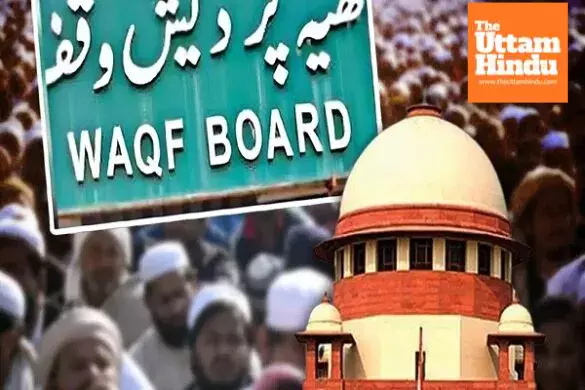Centre to SC: Declaration of being a muslim to be given is a must; Waqf not an important part of islam

New Delhi (The Uttam Hindu):- An important hearing is going on in the Supreme Court on the petitions challenging the Waqf Amendment Act 2025. On the third day, a big comment came when Supreme Court Justice Augustine George Masih said amid the arguments of Solicitor General Tushar Mehta – "Islam will remain Islam no matter where one lives."
Solicitor General Tushar Mehta, appearing on behalf of the Central Government, justified the provision of the requirement of being a practicing Muslim for the person doing the Waqf in the Waqf Act and said that even in Sharia law, if a Muslim wants to take advantage of the Personal Law, he will also have to give a declaration of being a Muslim. This law also has the same thing, only it has been said to be a practicing Muslim for five years. Solicitor General Tushar Mehta said, in the old law also it was said that the person doing the Waqf would be a Muslim, but in the amendment of 20213, the word Muslim was removed and replaced with any person. It has been changed in this new amended law. He said that only a Muslim will do the Waqf. And if any Hindu wants to donate to the Waqf, he can still do it, there is no restriction on it in the law. If a Hindu wants to build a mosque, he can do so, it can be done through a trust.
Solicitor General justified the provision that Waqf cannot be in Tribal Area i.e. Scheduled Area and said that ST Scheduled Area has been protected constitutionally. They have been protected for valid reasons. He said that this provision is not such that an interim stay can be imposed on the law on its basis. Many petitions are pending in the Supreme Court, in which the validity of the Waqf Amendment Act 2025 has been challenged. A bench of Chief Justice BR Gavai and AG Masih is currently hearing the petitions demanding an interim stay on the law. After the arguments of the petitioners, the Central Government has put forth its side. After this, the petitioners are again arguing in response. On behalf of the Central Government, Solicitor General Tushar Mehta on Wednesday had argued that the law does not interfere in the religious matters of Waqf, it is only in relation to the secular activities of administrative management of Waqf properties.
He had said that there is no dispute that Waqf is an Islamic concept, but it is not an essential part of Islam. Until this is proved, the rest of the arguments fail. Citing a previous Supreme Court verdict, Mehta said, 'Charity is a part of every religion but the court has said in its verdict that it is not an essential part of religion. There is a system of charity among Hindus, there is charity among Christians, there is charity among Sikhs, but it is not an essential part of religion.' He said that if the work of the Waqf Board is seen, it ensures the management of Waqf properties i.e. the accounts are proper, the accounts are audited, etc. These works are completely secular. Mehta said that what difference will it make if there are only two non-Muslim members in the Waqf Board, will it change its character? The Waqf Board is not touching any religious activity of the Waqf.
